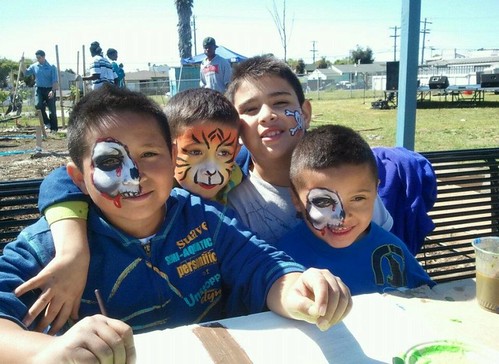
This year, more than 80 volunteers worked together to plant 20 trees, 117 native and edible understory plants, and more than 600 butterfly garden plants as part of the Cesar Chavez Community Garden Day celebration at the Edible Forest garden on the Richmond Greenway, a 2.8-mile trail in Contra Costa County, Calif.
The Edible Forest received cost-share funding through the U.S. Forest Service as part of the More Kids in the Woods Challenge in 2010 as a way to get kids connected to nature. The More Kids in the Woods funding was used to help train and employ eight young people from the Coronado and Iron Triangle neighborhoods in Richmond. They learned about urban and edible forestry and designed and installed their project with the help of Urban Tilth, an organization that works with areas schools, business and community organizations to develop the capacity to produce 5 percent of their food supply.
Hao C. Tran, who at the time was assistant director of the agency’s Pacific Southwest Research Station, connected with Doria Robinson of Urban Tilth to help develop the project. Tran has since transferred to the Northern Research Station.
Robinson says that the food grown is only part of the focus. “What’s really a [food] desert is opportunity,” she said in an Urban Tilth blog, adding that the organization is about “people building resiliency to create what they need.”
Because the area has some of the highest dropout rates, gun violence, and unemployment in the state, the event was also used to give young people information about potential careers in natural resources, concepts of public land, open space, and refuge from the urban environment and violence.

“My main objective of doing conservation education is to give hope,” said Timothy Williams, Forest Service regional Conservation Education coordinator. “If we can instill that feeling of hope, they can wake up ready to educate themselves and go to bed at night not afraid of the future so they can dream. If they have that, they have everything.”
More Kids in the Woods supports other USDA and administration efforts, includingFirst Lady Michelle Obama’s Let’s Move Outside! campaign, which works to get kids active outside and living a healthier lifestyle. More Kids in the Woods projects include activities and programs designed to spark curiosity about nature and promote learning. It also supports USDA’s Know Your Farmer, Know Your Food initiative, which helps strengthen local and regional food systems. Several Forest Service programs are highlighted in the Know Your Farmer Compass, a recently-released guide to USDA resources for local food systems development.
The More Kids in the Woods cost-share program involves thousands of partners who contribute their time, energy and resources to connect kids and families with the natural world. For more information about More Kids in the Woods project funding, visit the Forest Service website.


